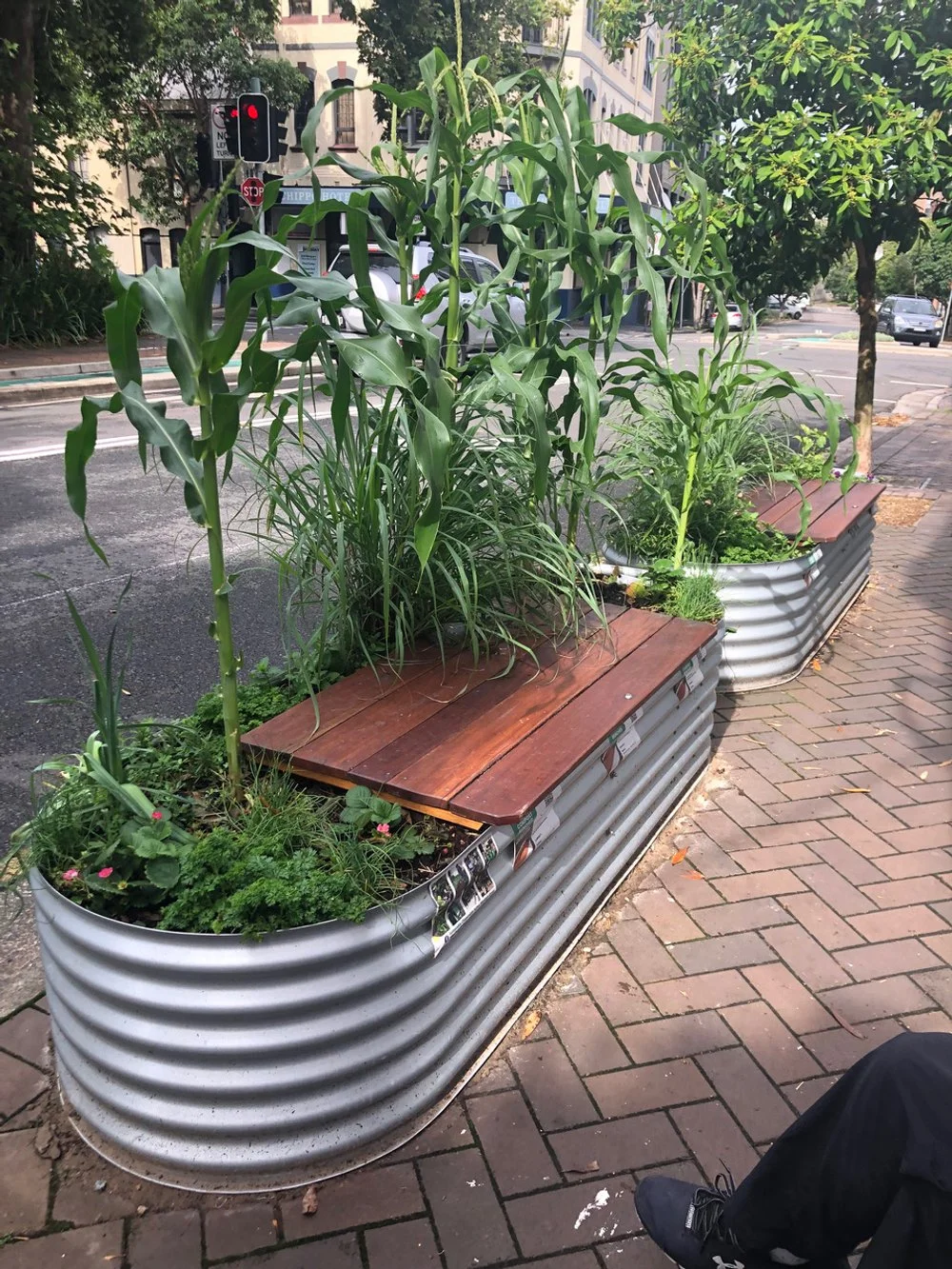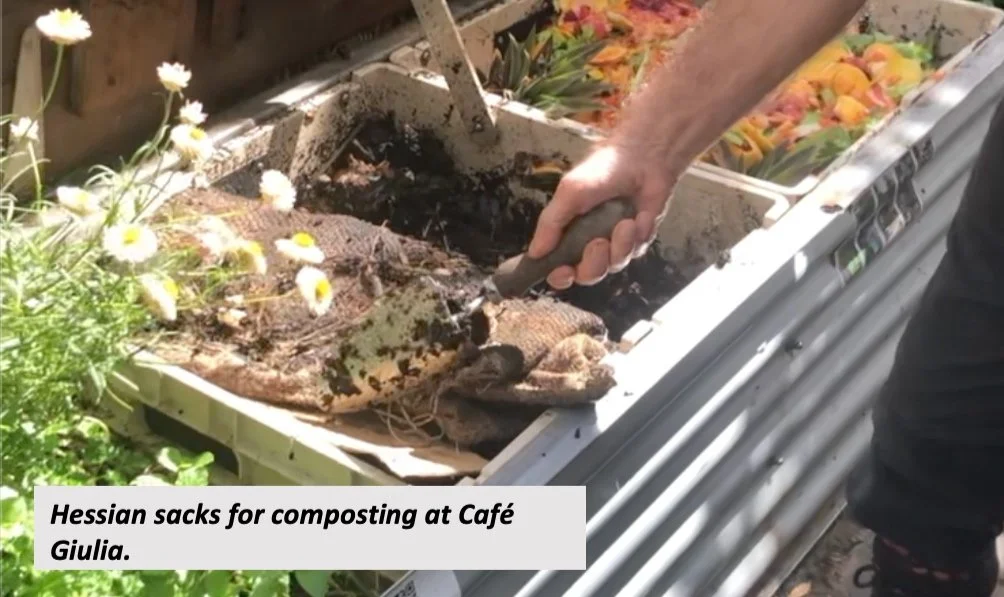Marie Neubrander, an intern with Sustainable House and a mathematics and computer science student at the University of Alabama, describes how and why a Sydney cafe, Cafe Giulia, began to end other waste streams after it first began to compost waste food in two coolseats on the footpath outside the cafe.
Hello, from San Pedro, Belize (only until the end of February - then, I will be back in Tuscaloosa, Alabama) where I’m working remotely with Sustainable House based in Sydney Australia. My present project is to research and show data about cafes avoiding, reducing and ending food and other waste. Here is the story of a journey to end such waste by one Sydney cafe, Cafe Giulia.
• The seat that is a compost - two coolseats outside Cafe Guilia, Chippendale, Sydney
Coolseats, which provide users a functional and aesthetically pleasing method of recycling their food waste, are most directly geared towards increasing composting efforts in plain view - streets, schools, units, housing.
However, coolseats have potential to inspire food waste avoidance impacts beyond only composting. When users are dealing more carefully with food waste as opposed to simply tossing it in the bin, experience suggests, and research confirms, that they will also become more conscious about working towards waste reduction as a whole.
Cafe Giulia, local to Chippendale in Sydney, NSW, Australia, is a prime example of coolseats’ potential to prompt a multitude of waste-saving activities.
In December 2021, Michael Mobbs posted a blog addressing Cafe Giulia’s initial coolseat implementation, highlighting the amount of food waste saved. Within their coolseat’s first week, Cafe Giulia composted 327.8kg of food waste, which prevented up to 2,514kg of CO2 emissions. Revisiting this cafe, we see that the positive changes brought by the coolseat have lasted.
• (Marie has used the US spelling of “Liters” otherwise known as “litres”)
Before Cafe Giulia installed a coolseat, it required six garbage pickups per week of a 120L food waste bin (or, about 720L of food waste a week). Now, months later, they require only three pickups each week, indicating a long-term 50% reduction of the amount of food Café Giulia is sending to landfills (down to about 360L a week). This cuts climate pollution and is also cutting costs for the cafe, roughly halving the amount of money spent on garbage pickups in a pay as you throw system.
A ‘pay as you throw system’ is available to cafes and other businesses not obliged to use local council or municipal garbage services with fixed costs. In many states in the United States, residents have the financial opportunity to ‘pay as you throw’ - if the resident does not throw out food or other waste, or throws less of it, research clearly shows they both pay less and are incentivized to end and reduce waste. Research by the US Environment Protection Authority shows that financial incentives which reward reducing waste are the most cost effective solution. Cafe Giulia’s composting success highlights the relationship between potential environmental and financial benefits of such programs.
Further working to avoid waste, in the past months, Cafe Giulia has been creative in its methods, going beyond only composting food scraps.
Previously, the cafe would throw away the hessian sacks their potatoes came in, the bags their coffee beans came in, and their coffee grounds. Now, they add the hessian sacks to the top food scrap compost (as is shown in the above video); the sacks’ ability to block light combined with their breathable nature make them beneficial for the worms in the compost system. The bags their coffee beans come in are now repurposed as packaging for compost given away for free to their customers and instead of throwing away their coffee grounds, Cafe Giulia donates them for free use by customers.
Cafe Giulia’s creativity in food waste reduction is a model for the potential impacts of coolseats and, more generally, composting. In the coming weeks and months, we are looking forward to promoting and highlighting additional waste avoidance efforts.
• Calculator - simple and quick to to use - to count the cost and pollution savings of cafe food and other waste
Currently, with cafe feedback, we are developing a calculator for cafes to use to determine the pollution and financial savings from their composting efforts. It gives cafes the ability to track their day-to-day preparation, plate, and spoilage waste. Being able to easily track these numbers provides a concrete way for cafes to visualize the amount of food lost at different production points; in turn, this may promote wider waste avoidance efforts.
One improvement we’re adding to the calculator is giving the user options to describe by type and quantity the other waste avoided, reduced or ended that’s triggered by or associated with composting.
When we begin to track our food waste and, with the coolseats project, compost, we then become more aware of other waste we have in our home, cafe, business, school, units and other places. The research shows that tracking and assessing food waste is an important step in beginning waste reduction techniques as it can demonstrate the highest sources of waste.
The coolseats project, a partnership with the NSW government Environment Protection Agency project called, Love Food Hate Waste, is not only about the coolseats and composting. It’s about all waste and about avoiding and reducing it by any means.
In this project I’m working on I hope to inspire cafes and others, including you, dear reader. I hope for all of us to find a holistic passion for avoiding, reducing, and ending food and other waste.
Marie Neubrander






